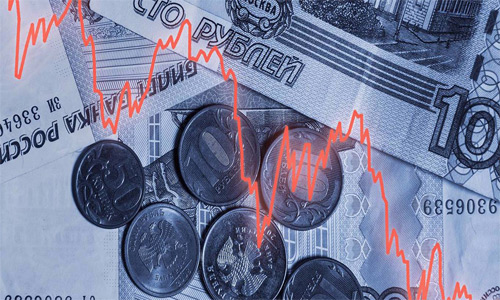Even Russian President Vladimir Putin’s most loyal followers would have to admit, if only to themselves, that this year’s televised call-in program – an annual event during which he responds to citizens’ questions directly – went worse than ever before. Citizens wanted to know why their lives aren’t improving under Putin, with some even asking when he would leave office. The president’s reassurances were not convincing.
The Russian economy is at a standstill. From 2014 to 2018, GDP grew by just 1.85% – or 0.4%, on average, each year. (The Kremlin forced the State Statistical Committee to revise upward the figures for 2016 and 2017.) During the same period, real disposable incomes shrank by 10.7%, leaving 13% of all Russians living in poverty. In 2018 alone, 600,000 Russian companies shuttered their operations.
To some extent, these developments are not surprising, given the sanctions imposed on Russia by Western countries after Russia’s annexation of Crimea in 2014. Those sanctions contributed to massive capital flight – in excess of $317 billion – in 2014-2018, as well as a drop in investment. In the first nine months of 2018, the volume of foreign direct investment in the Russian economy was 11 times lower than during the same period in 2017.
But there are also good reasons why Russia’s economy should be doing better than it is. The ruble has depreciated by 45.5% against the US dollar since 2014 – a trend that should have boosted Russia’s export competitiveness – and the inflation rate is at its lowest level in years. Moreover, Russia recorded a budget surplus of ₽2.75 trillion ($44 billion) in 2018.
So why has Russia’s economic performance been so persistently weak? The answer begins with the supposed “economic miracle” of the 2000s.
Contrary to popular assumption, Russia’s rapid growth at the beginning of this century was not exclusively the result of a massive inflow of petrodollars. Three other critical factors played a role. First, the liberal economic and tax reforms of 2000-2002 encouraged entrepreneurs to invest and consumers to earn and spend. Second, foreign capital flooded the Russian economy, and even created several new sectors. Third, industries that had been non-existent or underdeveloped in the 1990s began to contribute substantially to GDP growth.
As a result, residential construction, wholesale and retail trade, banking and insurance, personal services, lodging and restaurants, mobile telecoms, and web-based services contributed to about 70% of growth in 2000-2008. The rest was largely recovery growth. Oil production barely exceeded the levels achieved during the Soviet Union’s later years.
Then, in 2008, growth in demand for those new services plateaued. The problem was compounded by foreign investors’ flight after 2014 and, with the Kremlin shifting back to dirigisme, the demise of economic liberalism by 2018.
Russia’s economic prospects are unlikely to improve substantially anytime soon, for a simple reason: Putin’s indifference. He is confident that Russians – many of whom depend on the state for their incomes, in the form of pensions and welfare benefits – will not revolt. Given this, improving the investment climate or promoting technological innovation are, from his perspective, more trouble than they’re worth. He certainly does not want to nurture economic competition robust enough to spill over into the political sphere. For him, the economy has one main purpose: to serve the needs of him and his cronies.
In Putin’s Russia, the government’s function is to collect taxes and duties from successful enterprises and appropriate oil and gas rents, in order to fund short-sighted policies (such as military adventurism abroad) and buy the loyalty of bureaucrats. Unsurprisingly, public service can be an extremely lucrative enterprise: one colonel at the Federal Security Service, for example, used his position to accumulate a staggering $190 million in cash.
With the fiscal multiplier either at or below zero and taxes still rising, Russia has no chance of achieving overall economic growth. The only possible source of growth – a rise in household incomes – would require the government to launch a massive campaign to eradicate poverty, and Putin would prefer to channel revenues toward expanding the government’s reserves or funding “national projects” that create abundant opportunities for graft.
During Putin’s call-in, one citizen complained that the president has now been in power longer than Leonid Brezhnev, whose 18-year tenure made him the second-longest-serving Soviet leader. Given that Brezhnev oversaw an era of economic stagnation, the comparison could not be more apt.
Nonetheless, there is a difference between stagnation and crisis, and while Putin seems to have no interest in fostering economic growth, he also has no intention of taking excessive risks. Low inflation – the result of a lack of consumer demand – means that the authorities can devalue the ruble without causing prices to surge, thereby increasing the ruble value of their revenues. No economic policymaker will bother to look beyond the next election. Ultimately, the economy will remain on petrodollar “life support” – not getting any stronger, but surviving.
As I predicted in 2016, Russia’s economy is on track either to stagnate further or to enter a mild recession, both because it has lost its past sources of growth and because the government has shown little inclination to develop new ones. In a paternalistic society divided between masters and serfs, the lord would rather distribute less wealth among his subjects than allow them to generate more wealth themselves. Only then is his position safe.
Home » Opinion » Putin Doesn’t Care About Economic Growth
Putin Doesn’t Care About Economic Growth
| Vladislav Inozemtsev

